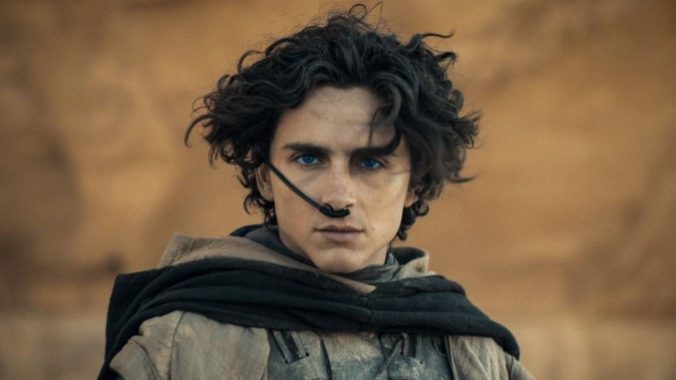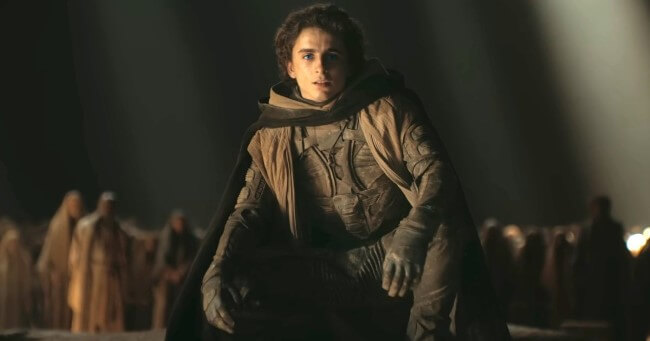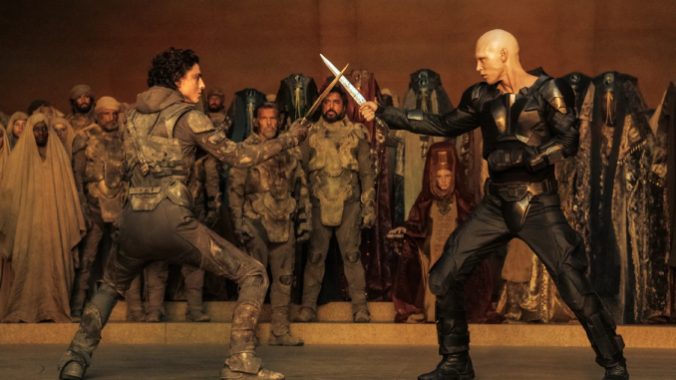I Promise You, Dune Is So Much Bigger than the “Is Paul Bad” Debate

Here’s the thing, when it comes to the overarching storyline of Frank Herbert’s seminal sci-fi series Dune: It really can’t be conveyed by simply reading Dune, or by adapting that book into a film. When finishing the original 1965 novel, one might be under the impression in that moment that Dune functions at least modestly well as a standalone tale in a unique sci-fi universe, albeit one that ends with an ominous cascade of blood and galaxy-wide turmoil on the immediate horizon. But from the opening pages of Herbert’s follow-up, Dune Messiah, it is immediately clear that any perception we have built up of a character like Paul Atreides while reading Dune is woefully incomplete. This is a story that can’t be told in full without the context of its own sequels, a story where each subsequent entry (at least through the first three or four books) radically alters how we view the past actions of the characters in all the material leading up to that point. In a story where so much of the plot becomes entangled in past and future lives, and the ability to perceive (and thus control) the future, knowledge of the full timeline is a necessity to genuinely see the big picture Herbert is hinting at throughout.
This is all to say the following: You may have seen the internet furiously debating the question of “Is Paul bad?” in the wake of director Denis Villeneuve’s Dune: Part Two. The answer is that not only is this a pointlessly blunt and simplistic question to pose while critiquing the film, it’s also a question that the audience is fundamentally unequipped to answer without the context of subsequent chapters in a much larger and more complex story that has only begun to play out. Herbert certainly wouldn’t have reduced the breadth of his life’s work to simply answering the question of whether or not Paul Atreides is “a bad guy,” and neither should we. It simply isn’t that simple, folks. I promise you, there’s more to the story of Dune than reducing it to such black-and-white platitudes … but reading a few novels may ultimately be the only way to appreciate this, because even the likes of Villeneuve probably won’t have a chance to finish bringing the full vision of Herbert’s work to life.
The audience’s instinctual urge to turn Dune into something more concrete and simple speaks to both the desire of viewers for hand-holding from the film’s writers as they apply characterization, neatly assigning each character’s morality into various camps, and the mirroring mandate of the film studio to take this material and turn it into something capable of being sold to the multiplex masses. “Is Paul bad” is precisely the kind of ultra-concentrated prompt that serves the desires of film producers and marketers, being simple enough to launch hundreds of Twitter threads in the wake of the film’s release, digital gladiator pits in which new fans of the series duke it out in a quest to see who can simplify the story’s themes the most carelessly.
Suffice to say, these debates instead have the tendency to obliterate any form of nuance or subtlety that exists in the greater Dune storyline, separating the fandom into tribalistic, squabbling camps with such simple viewpoints as “Paul is a hero who liberates the Fremen,” or “Paul is a power-hungry madman who unleashes a deadly jihad on the galaxy.”
It’s not that the true answer is “it’s both of those things,” either. It’s that it’s both, and neither, and so much more. But the audience’s ability to make these judgments is constrained by another question: How much will Villeneuve be able to show us in any subsequent films? And has he chosen to make films informed by source material he may never intend to adapt? Does that source material even exist, if no one intends to adapt it?
The Great Moral Struggle of Dune

![]()
Dune is inherently difficult to condense because it contains fertile ground for debate on so many social issues that are relevant today, from environmentalism to xenophobia, free will to artificial intelligence, the morality of genetic editing to the distrust of powerful, supposedly benevolent institutions. If the entire breadth of the series can come down to a unifying theme–and I’m not really claiming it does, but if it can–then that theme is perhaps that of liberty vs. tyranny or free will vs. predestination.
For the majority of Dune, Paul Atreides is only dimly aware of the paramount nature of this conflict, because his abilities as the fabled Kwisatz Haderach sought by the Bene Gesserit breeding program haven’t yet fully awakened. From the beginning, he is plagued by a sense of impending doom, a feeling of “terrible purpose” he continuously alludes to. His slowly opening third eye warns him that there is danger and violence ahead no matter what path he takes, and that among other things he’ll have to choose the direction of that violence. In an effort to make the films digestible, more of Paul’s driving motivation is implied to be that age-old cinematic chestnut: Revenge for his slain father. But in the books, it’s more clear that a motivation as simple as “revenge” barely enters into the equation.
That isn’t to say Paul didn’t love Duke Leto Atreides, as he certainly idolized him as a young man growing up on Caladan. But Dune is a story about Paul’s awakening into an incomprehensibly wider world where he is bound by both the responsibility of leading large communities and, ultimately, the responsibility for the entire human species. We are seeing him progressively growing into a being for whom “love” is an increasingly abstract concept. As his abilities as the Kwisatz Haderach fully manifest, Paul’s consciousness is able to swim through ancestors going back to the dawn of man, and many possible futures. And when you can see and recall the sum total of human existence, emotion related to the present steadily begins to fall away from the process of decision making. It isn’t that empathy goes away, but instead that Paul develops more empathy for the species, and less for individuals as he sees the world from a 10,000 foot view.
And what Paul sees coming is horrifying, but only really touched on in the briefest of ways in Dune. Seeing Villeneuve’s film, one could come to the conclusion that the coming jihad–the film uses the term “holy war” to avoid Islamic scapegoating–is a conscious decision made by Paul to drench the galaxy in blood in avengement of his father, a childish tantrum to ransack the Imperium of Emperor Shaddam Corrino IV in response to the plot against Duke Leto. Paul’s Muad’Dib’s resistance to what are implied to be coming atrocities seems oddly shallow and inconsistent, while Villeneuve uses Chani throughout–to a degree almost hard to believe at times–to criticize his seeming thirst for nihilistic destruction.
-

-

-

-

-

-

-

-

-

-

-

-

-

-

-

-

-

-

-

-

-

-

-

-

-

-

-

-

-

-

-

-

-

-

-

-

-

-

-

-









































